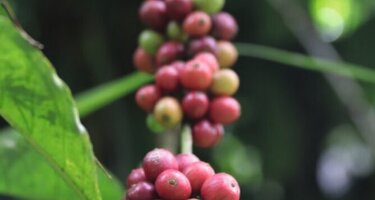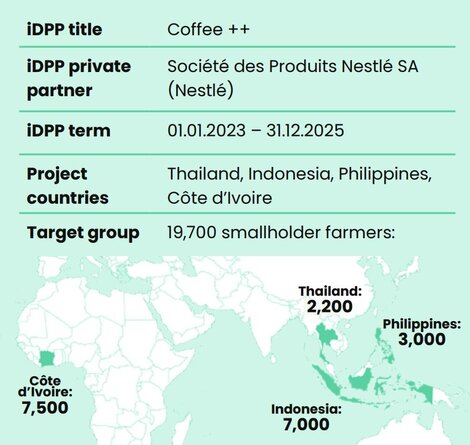Coffee++
Partnership between Nestlé and GIZ for a sustainable coffee supply chain
What is an integrated development partnership?
An integrated development partnership (iDPP) is a joint initiative between a project of Deutsche Gesellschaft für Internationale Zusammenarbeit (GIZ) GmbH and one or more private companies. In the case of Coffee++, the iDPP is incorporated into the global programme “Sustainability and Value Added in Agricultural Supply Chains”.
Background
Despite the rising demand for Robusta coffee, coffee yields in key growing countries such as Côte d’Ivoire, Indonesia, the Philippines, and Thailand remain well below potential and are increasingly affected by the impacts of climate change. Production and cultivation methods are seldom adapted to climate change, and innovative approaches such as regenerative agriculture and related practices are not commonly adopted. A significant proportion of smallholder producers live in poverty. Often, producers lack access to knowledge and resources to implement modern, sustainable, climate-adapted, and economically optimised farm management.
The Coffee++ project
Coffee++ follows the collaboration between GIZ and Nestlé on the develoPPP project “Improving Smallholder Coffee Farming Systems in Southeast Asia (Coffee +)”. The Coffee++ iDPP builds on this foundation and provides producers in Côte d’Ivoire, Indonesia, Philippines, and Thailand with technical and entrepreneurial knowledge to help improve incomes and climate resilience. Farmer training activities are based on proven approaches such as good agricultural practices, regenerative agriculture practices, farmer business school (FBS), agroforestry practices, and the strengthening of farmers’ organisations. Implementation takes place through field trainings as well as the rollout of digital tools such as the FBS app. By building strategic partnerships with public and private organisations, and civil society, Coffee++ aims to amplify and scale up the developmental benefits beyond the scope of the project.

Curbing emissions through regenerative agriculture:
Nestlé and GIZ are supporting farmers to adopt regenerative agricultural practices such as agroforestry and cover crops. This can improve soil health and biodiversity and reduce the carbon emissions of coffee cultivation. In Ivory Coast and Indonesia, Nestlé is piloting incentive payment schemes with farmers in which they receive a direct mobile money transfer for the proven adoption of regenerative agriculture practices.

Progress towards bridging the living income gap:
Through crop diversification, yield increase, and incentive payments for the adoption of regenerative agricultural practices, household incomes can increase. Farm-level data is collected with a digital tool, and the learnings are shared with stakeholder forums and industry associations such as the Technical Workstream Living and Prosperous Income, part of the public- private Task Force of the International Coffee Organization (ICO).

